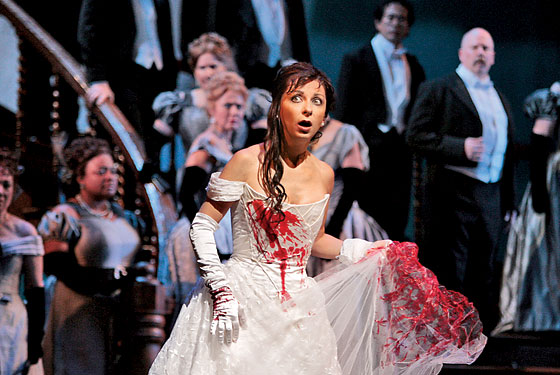
This year’s opening night at the opera doubled as the first anniversary of the Met’s metamorphosis, and general manager Peter Gelb delivered what he had promised: glamour, including representatives from Hollywood’s intellectual wing; a popular outdoor festival with broadcasts to Times Square and Lincoln Center plaza; a production that was lively to the point of hysteria; and singing that bordered on stunning.
The Met used the occasion to anoint a fresh star, the petite French soprano Natalie Dessay, whose zombie eyes have been gazing undeadly from bus-stop posters for the last several weeks, advertising a new production of Donizetti’s Lucia di Lammermoor. She has deserved divadom for a while, though she has also suffered from vocal afflictions that threatened to end her career. On this night, both she and her voice were vigorous and lithe—the one springing to her feet with a giggle after tripping on an overlong gown, the other missing nary a semiquaver, scudding and gliding on currents of turbulent melody. A good Lucia depends on a superb Lucia—a singer who can sprinkle the air with notes that seem to have drifted from her love-ravaged brain. In the crucial mad scene, the orchestra practically abandons her, making the voice sound fragile and alone in that big, thick silence. Dessay, undaunted, turned in a vocal performance of lucidly plotted insanity: silvery, graceful, and extravagant.
Dessay considers herself an actress first, but here she overwhelmed her thespian subtleties in a gale of clutchings and gaspings that would have made Sarah Bernhardt blush. The singer’s giddiness, combined with her vocal discipline, barely grazed her character’s desperation, and the evening’s most compelling emotion came at curtain call, when she pumped her fists as if she had sunk a hole in one.
Good sport that she is, Dessay tried hard to fit in with the deliberate tastelessness of Mary Zimmerman’s production. Her hair greased and stringy, her mascara applied with a trowel, Lucia looked like Tim Burton’s Corpse Bride. Zimmerman had fun with the opera’s over-the-top aesthetic: Once you’ve got a bloodstained bridal gown, a glinting dagger, and a crowd of horrified party guests, why stop there? At the end of the mad scene, after Lucia’s melodious collapse, a trio of tuxedoed swains carried her in slo-mo up a curving staircase, giving the ovations time to ring. Then the staircase itself twirled silently into the wings. Act Three took place on—what else?—a dark and stormy night, in a room with ink-black walls and bolts of lighting embedded in the surface: a hall that manufactures its own weather.
It can be hard to take Donizetti’s Scottish weeper seriously, and while James Levine, who has never deigned to conduct the work before, produced a consummately professional simulation of passion, Zimmerman didn’t try. One mildly funny scene helps explain why she shunted the setting from the seventeenth century to the nineteenth: As the disconsolate Lucia is being forced into a marriage for the good of the clan, a photographer arranges the party into album-ready groupings. The director seems to be saying that, just as a posed wedding photo disguises the ruptures that family ceremonies can prompt, this piece prettifies misery into a series of ravishing numbers. It’s not a message bel canto fans particularly want to hear—but she’s right.
There were phantoms in the house that night, and not just the hokey, chalky specters lurching around the set. The evening began with a silent remembrance of Luciano Pavarotti and Beverly Sills, both of whom sang Lucia at the Met. At intermission, I wandered onto the plaza, where a young Pavarotti materialized on the jumbo screen to sing “Una furtiva lagrima,” efficiently undermining the living tenor laboring back there in the house. That was Marcello Giordani, a singer of oaken voice and stolid demeanor who has drifted slowly to the top of the tenorial ranks. A less suicidal type is hard to imagine, which may be why, in the final moments, Zimmerman had a silent Dessay, as the dead Lucia’s spirit, waft in to give him a ghostly hand with the knife. When deceased singers steal the show and live ones can’t be trusted to off themselves properly, something is amiss.
Lucia di Lammermoor
By Donizetti. Metropolitan Opera. Through March 13.
